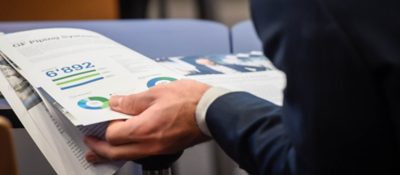Download of Reports and Presentations
Financial Year 2024
Financial Year 2023
Mid-Year Report 2023
Financial Year 2022
Presentations 2022
- Corporate Reports 2022: Presentation Annual Media Conference (PDF/ 4 MB)
- Corporate Reports 2022: Presentation Financial Analysts' Conference (PDF/ 4 MB)
- Investors Presentation November 2022 (PDF/ 5 MB)
- Mid-Year Report 2022: Presentation (PDF/ 3 MB)
- Capital Markets Day: Introduction (PDF/ 5 MB)
- Capital Markets Day: GF Piping Systems (PDF/ 4 MB)
- Capital Markets Day: GF Casting Solutions (PDF/ 4 MB)
- Capital Markets Day: GF Machining Solutions (PDF/ 6 MB)
Mid-Year Report 2022
Financial Year 2021
Mid-Year Report 2021
Sustainability Report 2021
Financial Year 2020
Mid Year Report 2020
Sustainability Report 2020
Financial Year 2019
Presentations 2019
- Annual Report 2019: Annual Media Conference (PDF/ 6 MB)
- Annual Report 2019: Financial Analysts' Conference (PDF/ 6 MB)
- GF Capital Market Day Introduction (PDF/ 5 MB)
- Capital Market Day GF Piping Systems (PDF/ 2 MB)
- Capital Market Day GF Casting Solutions (PDF/ 2 MB)
- Capital Market Day GF Machining Solutions (PDF/ 3 MB)
- Mid-Year Report 2019: Presentation (PDF/ 2 MB)
- Investor Presentation October 2019 (PDF/ 5 MB)
Mid Year Report 2019
Sustainability Report 2019
More Information
Financial Year 2018
Mid Year Report 2018
Sustainability Report 2018
Financial Year 2017
Presentations 2017
- Annual Report 2017: Presentation Annual Media Conference (PDF/ 1 MB)
- Annual Report 2017: Presentation Financial Analysts' Conference (PDF/ 1 MB)
- Annual Report 2017: Investor Presentation (PDF/ 1 MB)
- Mid-Year Report 2017: Presentation (PDF/ 1 MB)
- Presentation 122nd Annual Shareholders' Meeting (only German) (PDF/ 2 MB)


